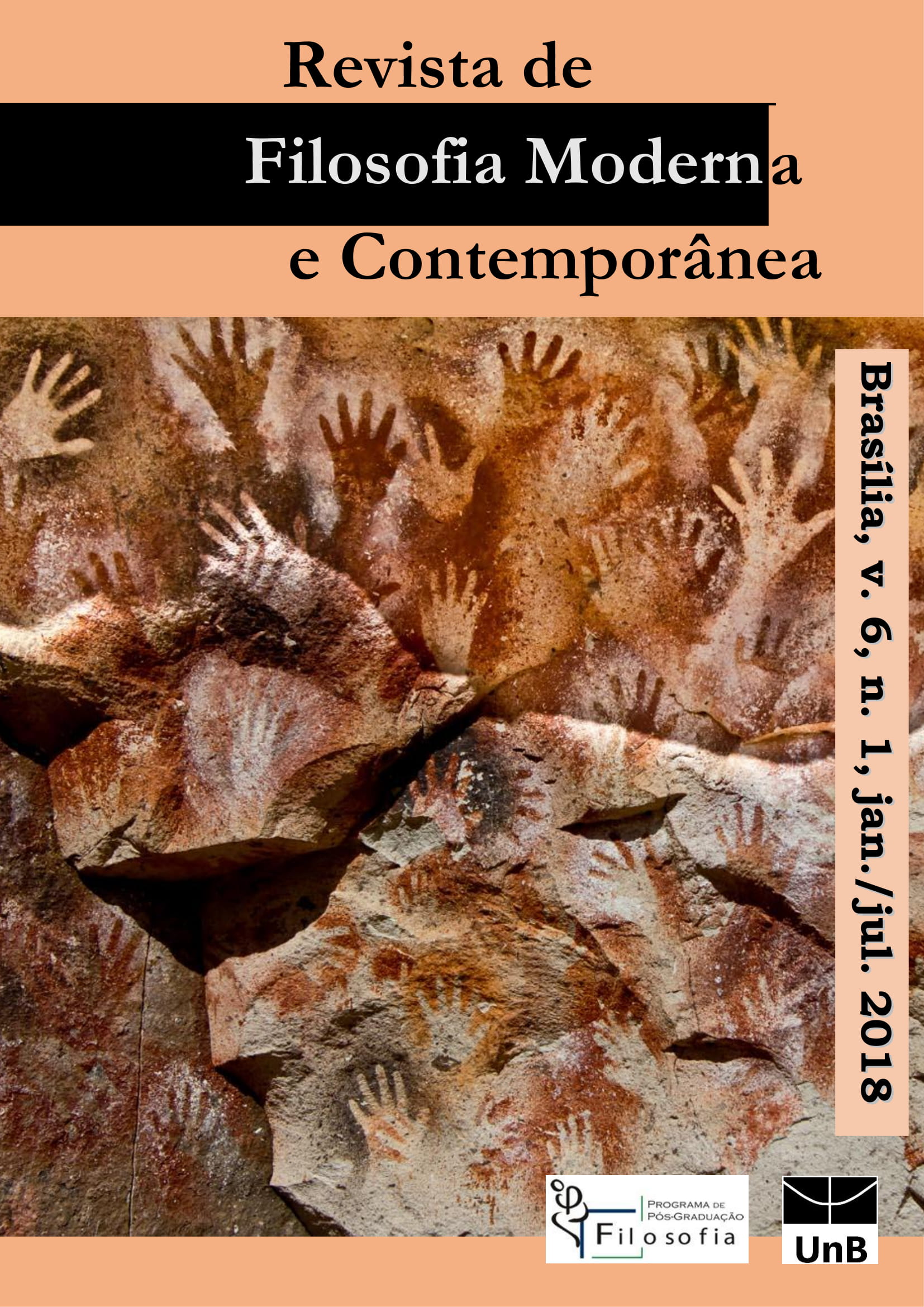Mutações no Estilo de Pensamento: Ludwik Fleck e o Modelo Biológico na Historiografia da Ciência
DOI:
https://doi.org/10.26512/rfmc.v6i1.20236Palavras-chave:
Ludwig Fleck. Estilo de Pensamento. Modelo Biológico. Thomas Kuhn. Historiografia da Ciência.Resumo
O objetivo desse artigo é analisar, a partir da obra de Ludwik Fleck, o papel da biologia e das ciências da vida como matriz modelar na constituição de uma teoria e metodologia de escrita da história da ciência. O que aqui é chamado de “modelo biológico” na historiografia da ciência. Em contraposição ao modelo de história da ciência kuhniano inspirado fortemente na física clássica ”“ ainda que posteriormente Kuhn tenha também se referenciado na biologia ”“ em Fleck, podemos encontrar uma história da ciência que se inspira na biologia e na medicina apresentando uma fundamentação epistemológica mais robusta que, consequentemente, permite uma melhor elaboração da escrita da história da ciência. Com efeito, analisando essa questão em Fleck também podemos constatar que ”“ além da afirmação dos aspectos sociais e históricos na construção do conhecimento científico como por ele defendido ”“, sua epistemologia também se assenta profundamente no referencial biológico fazendo, assim, do pensador polonês um precursor dessa abordagem. Ao destacar a importância da influência da biologia em Fleck, o artigo também salienta uma leitura não kuhniana do pensador polonês.Downloads
Referências
ABRANTES, P. “A metodologia da ciência ‘normal”’. In: ABRANTES, P. Método e ciência: Uma abordagem filosófica. Belo Horizonte: Fino Traço.
BACHELARD, G. Le nouvel ésprit scientifique. Paris: PUF, [1934] 2013.
BLOOR, D. Wittgenstein: a social theory of knowledge. London: Macmillan, 1983.
CANGUILHEM, G. O normal e o patológico. trad. Maria Barrocas. Rio de Janeiro: Forense Universitária, [1943] 2009.
CARNAP, R. “Letter to Thomas Kuhn” April 28, 1962. In: Gattei, S. Thomas Kuhn’s linguistic turn and the legacy of logical empiricism: incommensurability, rationality and the search for truth. Aldershot: Ashgate Publishing Company, 2008, p. 180.
CONDÉ, M. “Paradigma versus estilo de pensamento na história da ciência”. In: Condé, M.; Figueiredo, B. (Org.) Ciência, História e Teoria. Belo Horizonte: Argvmentvm, 2005.
CONDÉ, M. “Entre o normal e o patológico: Ludwik Fleck, Georges Canguilhem e a gênese da epistemologia histórica”. Intelligere. Revista de História Intelectual, São Paulo, v.2, n.1 [2], p.51-67. 2016.
CONDÉ, M. “Um papel para a história”: o problema da historicidade da ciência. Curitiba: Editora da UFPR, 2017.
CONDÉ, M. “‘The Philosopher and the machine’: Philosophy of mathematics and history of science in Alexandre Koyré”. In: PISANO, R., AGASSI, J., DROZDOVA, D. (eds.) Hypotheses and Perspectives in the History and Philosophy of Science. Cham: Springer, 2018. p. 43-61.
DASTON, L.; GALISON, P. Objectivity. Cambridge: Zone Books, 2007.
FLECK, Ludwik. Entstehung und entwicklung einer wissenschftlichen Tatsache. Frankfurt am Main: Suhrkamp. [1935] 1980.
FLECK, L. “Some specific features of the medical way of thinking” In: Cognition and fact: materials on Ludwik Fleck, ed. Cohen, R. & Schnelle, T. Boston: Reidel, [1929] 1986.
FLECK, Ludwik. “Scientific observation and perception in general” In: Cognition and fact: materials on Ludwik Fleck, ed. Cohen, R. & Schnelle, T. Boston: Reidel, [1929] 1986.
FLECK, Ludwik. “On the crisis of ‘reality”’. In: Cognition and fact: materials on Ludwik Fleck, ed. Cohen, R. & Schnelle, T. Boston: Reidel, [1929] 1986.
FLECK, Ludwik. Gênese e desenvolvimento de um fato científico, trad. Georg Otte e Mariana Oliveira. Belo Horizonte: Fabrefactum, [1935] 2010.
HULL, David. Science as a process: an evolutionary account of the social and conceptual development of science. Chicago: The university of Chicago Press. [1988] 1990.
HUSSERL, Edmund, Die Krisis der europäischen Wissenschaften und die transzendentale Phänomenologie. In: Biemel, WALTER (Org.) Husserliana. Haia: Martius Nijhoff, 1954. V. vi.
KUHN, Thomas. The structure of scientific revolution. Chicago: The University of Chicago Press, [1962] 1970.
KUHN, Thomas, “Foreword”. In: Hoyningen-Huene, Paul. Reconstructing Scientific Revolution: Thomas S. Kuhn’s Philosophy of Science. Chicago: The University of Chicago Press, 1988.
KUHN, Thomas. The road since structure. Chicago: The University of Chicago, 2000.
LATOUR, Bruno; WOOLGAR, Steve. La vie de laboratoire: la production du fait scientifique. Paris: La Découverte. [1979] 1996.
OLIVEIRA, B. J.; CONDÉ, M. “Thomas Kuhn e a nova historiografia da ciência”. Ensaio: Pesquisa em Educação em Ciências. 4: 2, 2002.
POPPER, K. “Evolution and the tree of knowledge”. In: Objective Knowledge: An Evolutionary Approach, Oxford: Clarendon Press, 1972.
RADNITZKY, G.; BARTLEY, III, W. W. (Eds.). Evolutionary epistemology Rationality, and the Sociology of Knowledge. Chicago: Open Court, [1987] 1993.
REICHENBACH, H. Experience and Prediction: An Analysis of the Foundations and the Structure of Knowledge. Chicago: University of Chicago Press, 1938.
RENZI, B. “Kuhn’s evolutionary epistemology and its being undermined by inadequate biological concepts”. Philosophy of Science, 76 p. 143”“159. 2009.
SHAPIN, S.; SCHAFFER, S. Leviathan and the air-pump: Hobbes, Boyle and the experimental life. Princeton: Princeton University Press, 1985.
SCHUSTER, A. “The pitfalls and possibilities of following Koyré: The younger Tom Kuhn. ‘critical historian’ on tradition dynamics and big history”. In: PISANO, R., AGASSI, J., DROZDOVA, D. (eds.) Hypotheses and Perspectives in the History and Philosophy of Science.
Cham: Springer, 2018. p. 421-452.
Downloads
Publicado
Como Citar
Edição
Seção
Licença
Direitos Autorais para artigos publicados nesta revista são do autor, com direitos da primeira publicação para a revista. Em virtude dos artigos aparecerem nesta revista de acesso público, os artigos são de uso gratuito, com atribuições próprias, em aplicações educacionais e não-comerciais.


